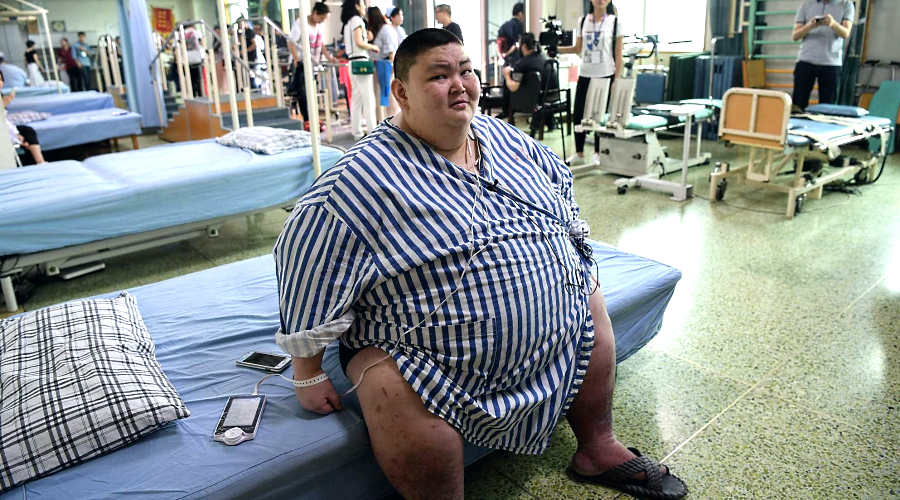
BEIJING: According to a leading doctor, more than 30,000 cases of metabolic and bariatric surgery, or MBS, which helps to reduce food consumption and aids weight loss by reducing stomach size and, in some cases, by rerouting part of the patient’s digestive system, were performed in China last year.
The rise in the number of patients resorting to surgery not only reflects a better understanding of these medical procedures among the public, but perhaps more importantly, highlights the country’s increasing rate of obesity, says Wang Bing, a chief surgeon at Shanghai No 9 People’s Hospital, which is affiliated with Shanghai Jiao Tong University School of Medicine.
His team started performing weight-loss surgeries 15 years ago, and was among the first in the country to do so.
The number performed by his team has leapt from a dozen a year initially, to around 300 currently.
“We find that a large proportion of patients coming to seek medical assistance at our department suffer from not only obesity but high blood pressure, diabetes and sleep apnoea, a serious sleep disorder in which breathing stops and starts repeatedly.
Obesity and its related metabolic diseases are usually cases of mutual cause and effect,” says Wang.
“It’s rather hard for these patients to lose weight through their own efforts by doing sports or dieting. They need to resort to external intervention to help break the body’s unhealthy metabolic cycle and state of obesity,” he says.
So far, MBS has proved to be the most effective treatment to sustain weight loss and, in most cases, is not prone to relapse, according to the doctor.
Implementation of the minimally invasive surgery has grown considerably since its introduction in the 1990s.
Approximately 100,000 of them are performed in the United States per year.
Wang says that most patients undergoing surgery will reach a healthy weight within three to six months after the operation.
Their weight will keep dropping for around two years afterward.
Obesity among Asians is generally different to Caucasians, according to experts. Asians tend to experience mainly abdominal obesity, meaning that individuals usually do not have excessively thick limbs, but have quite a lot of belly fat.
“Belly fat means excessive visceral fat, which is the root cause of a variety of metabolic disorders,” says Wang. “Compared with neighboring countries such as Japan and South Korea, China has a significantly higher obesity rate.”
Bariatric surgery usually triggers a series of chemical reactions in the patient’s body, says Wang.
“After the surgery, we usually find changes to the secretion of gastrointestinal hormones in a patient’s body, and the signals sent from the brain also change. All this helps solve metabolic problems dramatically,” says Wang.
According to treatment guidelines, MBS is recommended for individuals whose BMI is above 32.5, or above 27.5 if they suffer from two types of metabolic diseases.
Still, the actual number of patients seeking help only accounts for a small proportion of those suffering from obesity, along with various other everyday physical issues, including pain in the back and knees, difficulty sleeping, and motion or mobility problems.
Wang also says that while men account for 70 percent of obese individuals, women account for 70 percent of his patients, showing that women pay more attention to their appearance.
Experts have reminded the public to pay more attention to obesity, which was listed as a disease by the World Health Organization in 1948.
The latest official national statistics in 2020 showed that weight gain and obesity affected more than half of the Chinese population, almost double the rate in 2002.
Also in 2020, the rate of overweight or obese minors aged between six and 17 years old, and below six, stood at nearly 20 percent and 10 percent, respectively.
“The growth in the rate of overweight minors is a result of multiple factors, including a modern lifestyle and Westernized diets. People also traditionally believe that slimness is equivalent to unhealthiness to some extent,” Wang says.
A 44-year-old father and his 21-year-old son, from Shanghai, underwent surgery a month ago. They have lost 20 kilograms and 15 kg respectively.
The father, surnamed Pan, says that he tried various methods, including sports and taking slimming medication, to lose weight, all to no avail.
“I used to suffer from sleep apnoea, which made me suffocate and wake up often. After the surgery, I’m sleeping much better. Also, my belly fat has decreased rapidly, which has made moving around easier,” he says.
As well as severe sleep apnoea, he used to suffer from high blood pressure, high cholesterol and diabetes.
The son used to suffer from high cholesterol, high uric acid levels and cardiac hypertrophy.
The symptoms of many of their conditions have been alleviated, and doctors will continue to monitor indicators related to their metabolic disorders.
ADVERTISEMENT
ADVERTISEMENT








































